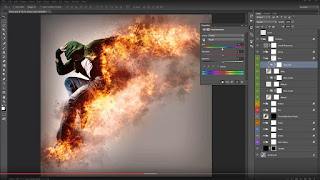Week 6: bioart
 |
| Visual of Biotechnology (LinkedIn) |
This weeks topic was by far the most
complex topic we covered because of the aspect of bioethics and if the manipulation
of biology is okay in art. I think bioethics is something that is clearly important
for our society because it, for the most part has the goal of helping humans.
However, the debate that continues to be around is if it okay to alter
biological organisms for the use of biotechnology. With that, I believe that
biotechnology is important for our society because as said in Center for Bioethics
and Human Dignity, writer Matthew Eppinette said that “given the fact of human frailty and the current state of medical
technology, it is likely that bioethics will touch our lives or a life very
near ours at some point.” This article proves the importance of biotechnology
in our society as something that is helping us more than hurting us.
 |
| Orlan Rewriting Western Art on Her body(UCSB) |
Even
through biotech may be ethnical in my eyes, I do not think using biotechnology
for art, unless it is proven to help people, is ethnical because people are
just using biological organisms for their own personal art pieces rather then
for the greater good of society. For example, artist Orlan used plastic surgery
as a form of art. Orlan “she decided to go under the knife again and again – not
because her life was at risk, but because she believed surgically changing her
body could be a powerful work of art” (Jefferies). Her using plastic surgery as
a form of art confused me because she put herself though so many surgeries just
to rewrite western art on her own body. She used plastic surgery as a way to be
different and create a clash with society instead of helping society. Orlan in
this way is an outlaw as noted in the essay “Meanings of Participation: Outlaw Biology?” because she
falls outside the system with her nutty ideas. (Kelty 1)
 |
| Kathy High: Blood Wars |
On the other side
of the art and biotech debate is artist Kathy High who has an art project
called Blood Wars where she does a tournament like competition between human
white blood cells to see who would win. However, this was not just for her own
entertainment because it actually helped scientist to understand “the processes
of blood cell division, cell staining, immune cells and the functioning of the
immune system, time-lapse microscopy and laboratory protocol” (High). These two
examples of biotech art show that it is a complex idea because there are so
many different types of this art. The real problem behind biotech art has to do
with the ethnics and as noted by Professor Versa the question at hand still is
if it is okay for artist to interfere with the “genetic structures of natural
systems” (Lecture Part 1).
References
Brown, Kevin. Biotechnology Conference at Frankfurt. Digital image. LinkedIn. N.p., 28 Feb. 2015. Web. 14 May 2017. <https://www.linkedin.com/pulse/biotechnology-conference-frankfurt-kevin-brown>.
English 114EM: Women Writers, 1650-1760. Digital image. UCSB. N.p., n.d. Web. 14 May 2017. <http://oldsite.english.ucsb.edu/faculty/ecook/courses/eng114em/endoforlan.htm>.
Eppinette, Matthew. "Bioethics: Why Should I Care?" Bioethics: Why Should I Care? | The Center for Bioethics & Human Dignity. Center for Bioethics and Human Dignity, 05 Feb. 2004. Web. 14 May 2017. <https://cbhd.org/content/bioethics-why-should-i-care>.
Jeffries, Stuart. "Orlan's Art of Sex and Surgery." The Guardian. Guardian News and Media, 01 July 2009. Web. 14 May 2017. <https://www.theguardian.com/artanddesign/2009/jul/01/orlan-performance-artist-carnal-art>.
"Kathy High: Visual/media Artist, Independent Curator, Educator." Kathy High: Projects: Blood Wars. N.p., n.d. Web. 14 May 2017. <http://www.kathyhigh.com/project-blood-wars.html>
"Kathy High: Visual/media Artist, Independent Curator, Educator." Kathy High: Projects: Blood Wars. N.p., n.d. Video. 14 May 2017. <http://www.kathyhigh.com/project-blood-wars.html>
Kelty, Chris. “meanings of participation:
Outlaw Biology?” Outlaw,
hackers, victorian amateurs: diagnosing public participation in the life
sciences today. March 2010. Web. 14 May 2017. PDF.
Vesna, Victoria. “Bioart Part 1.” Lecture. CoLE DESMA 9. Web.
Vesna, Victoria. “Bioart Part 1.” Lecture. CoLE DESMA 9. Web.


Comments
Post a Comment